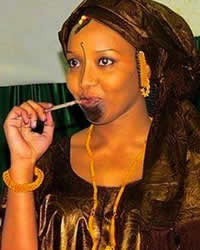Fulani, Toukaleur in Senegal

Photo Source:
OusmaneBABA - Wikimedia
Creative Commons
|
Send Joshua Project a map of this people group.
|
| People Name: | Fulani, Toukaleur |
| Country: | Senegal |
| 10/40 Window: | Yes |
| Population: | 771,000 |
| World Population: | 771,000 |
| Primary Language: | Pulaar |
| Primary Religion: | Islam |
| Christian Adherents: | 0.05 % |
| Evangelicals: | 0.01 % |
| Scripture: | New Testament |
| Ministry Resources: | Yes |
| Jesus Film: | Yes |
| Audio Recordings: | Yes |
| People Cluster: | Fulani / Fulbe |
| Affinity Bloc: | Sub-Saharan Peoples |
| Progress Level: |
|
Introduction / History
Toukaleur means “colorful,” and they are a subgroup of the greater Fulani cluster in West Africa. They speak Pulaar, one of the primary Fulani languages.
What Are Their Lives Like?
Toukaleur Fulani are primarily pastoralists, but they may engage in trade in some areas. Their women often use henna around the mouth, resulting in a blackening around the lips. The traditional dress of the Fulani in most places consists of long, colorful, flowing robes, modestly embroidered or otherwise decorated.
What Are Their Beliefs?
The various Fulani groups have a long-standing, strong commitment to Islam. It's part of their identity.
What Are Their Needs?
Christians need to help the Fulani with their material and physical needs, building bridges of trust and friendship in order to be heard effectively.
Prayer Points
Pray that the Fulani will be able to provide adequately for their families, as they live in a harsh region.
There are a few followers of Jesus in the Toukaleur Fulani community. Pray they will be nurtured by God's Spirit and will become mature in the faith.
Pray that soon Fulanis in Senegal will find their way to the cross and teach others about the only Savior.